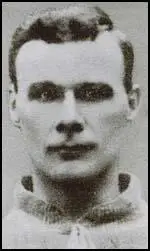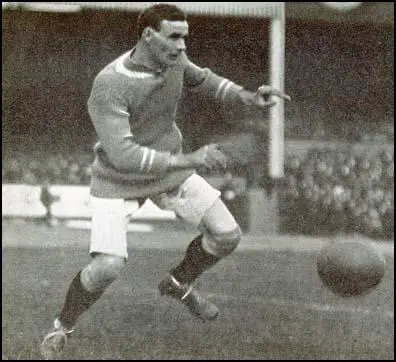Sam Hardy

Sam Hardy was born in Newbold Verdun on 26th August 1883. A talented goalkeeper, he played local football for Newbold White Star before joining Chesterfield Town in April 1903. For the next three seasons Hardy played in 71 games for the club.
In October 1905 Hardy was transferred to Liverpool for £500. According to Tony Matthews (Who's Who of Liverpool): "He (Hardy) made goalkeeping look easy and would have been considered a world-class player in any era."
Liverpool won the First Division title in the 1905-06 beating Preston North End by four points. Hardy's goalkeeping that season was magnificent and Jesse Pennington, the England full-back, claimed that Hardy was "one of the greatest goalkeepers I ever saw play."
Charlie Buchan went further: "Hardy, I consider the finest goalkeeper I played against. By uncanny anticipation and wonderful positional sense he seemed to act like a magnet to the ball. I never saw him dive full length to make a save. He advanced a yard or two and so narrowed the shooting angle that forwards usually sent the ball straight at him."
On 16th February 1907 Hardy won his first international cap for England against Ireland. George Hardy kept a clean sheet on his debut and kept his place for games that season against Wales (1-1) and Scotland (1-1). The England team that season included Bob Crompton, Steve Bloomer, Joe Bache, Colin Veitch, Vivian Woodward, Jesse Pennington, Irvine Thornley, George Hilsdon and William Wedlock.
After making 239 appearances for Liverpool Hardy was transferred to Aston Villa for £600 in May 1912. That season Aston Villa finished as runners-up to Sunderland. The club scored 86 goals with the main contributors being Harry Hampton (25), Harold Halse (21), Clem Stephenson (14) and Joe Bache (10).
Aston Villa beat Derby County (3-1), West Ham United (5-0), Crystal Palace (5-0), Bradford City (5-0), Oldham (1-1) to reach the FA Cup Final against Sunderland in 1913. Over 120,000 saw Aston Villa win the game 1-0. Hardy now had his first cup winners medal.
The authors of The Essential Aston Villa argue that "Hardy was a goalkeeper not given to acrobatics and he never embellished his work with unnecessary leaps and rolls. Instead, he kept goal with an economy of effort that had the effect of making him look as though he was always playing well within himself."
The outbreak of the First World War brought a halt to Hardy's footballing career. He served in the Royal Navy and on two occasions narrowly escaped serious injury.
Hardy remained at Aston Villa and in the 1919-20 season the club enjoyed a successful run in the FA Cup beating QPR (2-1), Manchester United (2-1), Sunderland (1-0), Tottenham Hotspur (1-0) and Chelsea (3-1).

Aston Villa played Huddersfield Town in the final at Stamford Bridge. The referee, Jack Howcraft, entered the Villa dressing-room before the game and warned Frank Barson that he would be sent off for any indiscretion. According to the authors of The Essential Aston Villa, "the normally unflappable Barson was taken aback and his performance was uncharacteristically cautious for much of the game." Billy Kirton got the only goal of the game and Villa won the cup for the sixth time in its history.
Hardy was considered the best goalkeeper in the Football League during the period before and after the First World War. Hardy won his last and 21st international cap for England against Scotland on 10th April 1920. England won the game 5-4.
Sam Hardy played 183 games for Aston Villa before being sold for £1,000 to Nottingham Forest in August 1921. He played in 109 games before retiring in May 1925. After leaving the game he owned a hotel in Chesterfield and a billiard hall in Alfreton.
Sam Hardy died in Chesterfield on 24th October 1966.
Primary Sources
(1) Charlie Buchan, A Lifetime in Football (1955)
It proved to be the most sensational of all the Crystal Palace finals. It was crowded with incidents, some of which are better forgotten.
First, there was the trouble between Charlie Thomson, our centre-half and Harry Hampton, Villa's dynamic centre-forward, the terror of goalkeepers. It was Hampton, who, in 1913, won an international for England at Stamford Bridge by charging Brownlie, the Scottish goalkeeper, with the ball in his arms, into the net.
Thomson and Hampton soon got at loggerheads and rather overstepped the mark in one particular episode. Though neither was sent off the field, they each received a month's suspension; the first month of the following season.
There was also an injury to Villa goalkeeper, Sam Hardy, which kept him off the field for about twenty minutes. The game was held up for seven minutes, making it the longest final, apart from extra-time, in the history of the event.
Hardy, I consider the finest goalkeeper I played against. By uncanny anticipation and wonderful positional sense he seemed to act like a magnet to the ball.
I never saw him dive full length to make a save. He advanced a yard or two and so narrowed the shooting angle that forwards usually sent the ball straight at him.
When the game was resumed, with Villa centre-half Jim Harrop in goal, we peppered away at the Villa goal. We hit the upright twice, but simply could not get the bail into the net.
Then, midway in this half, with Hardy back in goal, Villa forced a corner-kick on the right. Charlie Wallace took it and sent the ball waist-high somewhere about the penalty-line, a bad kick really.
Tom Barber, Villa right-half, dashed forward and got his head to the ball. As our defenders stood apparently spellbound the ball passed slowly between them into the corner of the net.
This amazing goal was enough to give Villa the Cup and made a dream come true for Clem Stephenson, Villa inside-left, of the stocky frame and north-country accent.
When we were lined up for a throw-in soon after the game started, Clem said to me: "Charlie, we're going to beat you by a goal to nothing."
"Oh," I replied, "what makes you think that?"
"I dreamed it last night," said Clem "also that Tom Barber's going to score the winning goal." I could not help but think of a song at the time which had these words: "Dreams very often come true."
A great schemer and tactician, Clem brought the best out of his colleagues by his accurate, well-timed passes. He was by no means fast but made the ball do the work.
He was the general who led the brilliant Huddersfield team to three successive League championships.
(2) Adam Ward and Jeremy Griffin, The Essential Aston Villa (2002)
There can be few men left alive who ever saw Sam Hardy keep goal for Aston Villa but those who remain will probably contend that the popular custodian was the greatest net minder in the club's history... Hardy was a goalkeeper not given to acrobatics and he never embellished his work with unnecessary leaps and rolls. Instead, he kept goal with an economy of effort that had the effect of making him look as though he was always playing well within himself.
